On and Off the Hill
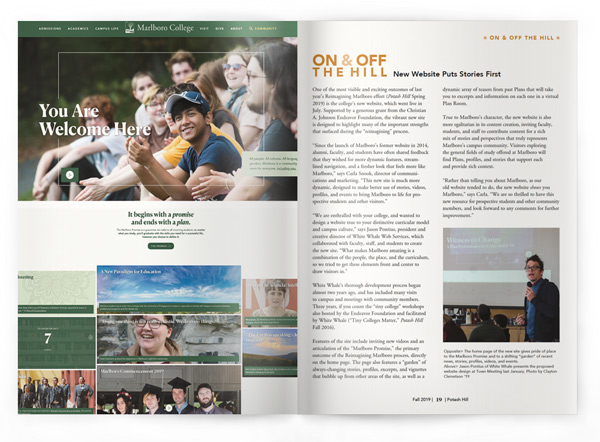
New Website Puts Stories First
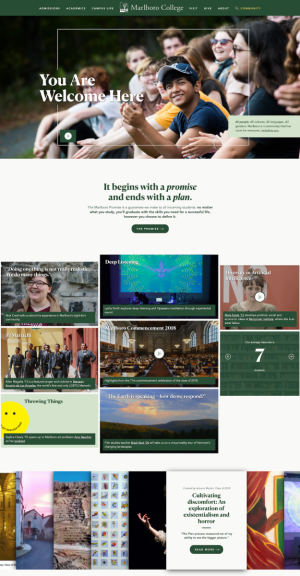 One of the most visible and exciting outcomes of last year’s Reimagining Marlboro effort (Potash Hill Spring 2019) is the college’s new website, which went live in July. Supported by a generous grant from the Christian A. Johnson Endeavor Foundation, the vibrant new site is designed to highlight many of the important strengths that surfaced during the “reimagining” process.
One of the most visible and exciting outcomes of last year’s Reimagining Marlboro effort (Potash Hill Spring 2019) is the college’s new website, which went live in July. Supported by a generous grant from the Christian A. Johnson Endeavor Foundation, the vibrant new site is designed to highlight many of the important strengths that surfaced during the “reimagining” process.
“Since the launch of Marlboro’s former website in 2014, alumni, faculty, and students have often shared feedback that they wished for more dynamic features, streamlined navigation, and a fresher look that feels more like Marlboro,” says Carla Snook, director of communications and marketing. “This new site is much more dynamic, designed to make better use of stories, videos, profiles, and events to bring Marlboro to life for prospective students and other visitors.”
“We are enthralled with your college, and wanted to design a website true to your distinctive curricular model and campus culture,” says Jason Pontius, president and creative director of White Whale Web Services, which collaborated with faculty, staff, and students to create the new site. “What makes Marlboro amazing is a combination of the people, the place, and the curriculum, so we tried to get these elements front and center to draw visitors in.”
White Whale’s thorough development process began almost two years ago, and has included many visits to campus and meetings with community members. Three years, if you count the “tiny college” workshops also hosted by the Endeavor Foundation and facilitated by White Whale (“Tiny Colleges Matter,” Potash Hill Fall 2016).
Features of the site include inviting new videos and an articulation of the “Marlboro Promise,” the primary outcome of the Reimagining Marlboro process, directly on the home page. The page also features a “garden” of always-changing stories, profiles, excerpts, and vignettes that bubble up from other areas of the site, as well as a dynamic array of teasers from past Plans that will take you to excerpts and information on each one in a virtual Plan Room.
True to Marlboro’s character, the new website is also more egalitarian in its content creation, inviting faculty, students, and staff to contribute content for a rich mix of stories and perspectives that truly represents Marlboro’s campus community. Visitors exploring the general fields of study offered at Marlboro will find Plans, profiles, and stories that support each and provide rich context.
“Rather than telling you about Marlboro, as our old website tended to do, the new website shows you Marlboro,” says Carla. “We are so thrilled to have this new resource for prospective students and other community members, and look forward to any comments for further improvement.”
NEH Supports Data Humanist Certificate
Marlboro College has always provided a wealth of interdisciplinary coursework, including courses drawing important links between the humanities and sciences. Now, with the support of a National Endowment for the Humanities (NEH) grant, the college is positioning itself to offer a new undergraduate Data Humanist Certificate Program, making these links even more explicit and demonstrating students’ preparedness for the workplace.
“There is an obvious utility in a student being able to say to a prospective employer, ‘I did some relevant data work,’” said Adam Franklin-Lyons, history professor and one of the faculty members who applied for the grant. “They might have studied literature, but they also worked with a state agency or nonprofit on a data project. If they are applying to do something similar, I think that’s a no brainer.”
The $30,000 NEH Humanities Connections Grant will support the development of a certificate program that provides clear links between humanities coursework and data-driven classes in mathematics, computer science, and biology. The certificate will involve taking two data classes, two humanities classes, and two designated “bridge” classes that are co-taught by faculty from both areas. It will also involve a capstone project that connects with the community in some way, through working for either a government agency, nonprofit, or other organization.
“The ideal is to have four bridge classes in rotation, so they each come around every two years,” said Matt Ollis, math professor, who is also on the grant. “Adam and I will co-teach Cartography once every two years, just as we have in recent years. And Jenny Ramstetter (biology) and Kate Ratcliff (American studies) will continue the Culture and Ecology of the Western US class they’re teaching this semester.”
Other bridge courses will take some development, but one about migrations among humans and other species, to be co-taught by Jenny and Rituparna Mitra (literature and writing), is in the planning stage. The grant team plans to collaborate with colleagues and finalize the certificate program through the Marlboro faculty for a proposed roll-out in fall 2020.
Marlboro Designated Changemaker Campus
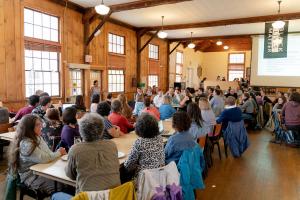 In July, after a long and rigorous selection process, Marlboro College was pleased to announce that it has been designated a Changemaker Campus by Ashoka U. One of approximately 45 leading colleges and universities globally recognized by Ashoka U, Marlboro brings its unique values of shared governance and self-designed learning to this network.
In July, after a long and rigorous selection process, Marlboro College was pleased to announce that it has been designated a Changemaker Campus by Ashoka U. One of approximately 45 leading colleges and universities globally recognized by Ashoka U, Marlboro brings its unique values of shared governance and self-designed learning to this network.
“Institutions in the Changemaker Campus Network set the bar for social innovation and social change in higher education,” says Kate Trzaskos, assistant dean of career education and one of the change leaders who have guided Marlboro through the designation process. “Marlboro is thrilled to be a part of this group, and to share what we have learned through our innovative curricular design and system of community governance.”
Ashoka U is an initiative of Ashoka, the world’s largest network of social entrepreneurs and changemakers. The initiative recognizes colleges and universities globally that, like Marlboro, have embedded social innovation and changemaking into their programming, culture, and operations and are committed to partnering to make this the new norm across higher education. Learn more at marlboro.edu/changemaker.
Students Bring Leadership to Smokies
During spring break in March, five students and OP director Adam Katrick ’07 made a trip to Great Smoky Mountains National Park for hiking, botanizing, and exploring the history of this extraordinary mountain range in Tennessee and North Carolina. The two-week trip was expertly planned and led by students Claire O’Pray ’20 and Lydia Nuhfer ’20—a testament to their leadership skills, including the experience they have gained at Marlboro.
“Being a Bridges leader for the past two years, planning the menu for the Yellowstone trip last year, and taking the Outdoor Leadership class all helped a lot in terms of feeling like I had a handle on the logistical aspects,” says Claire. “Leading this trip was super rewarding. Having people laugh every night, or just sit in silence at a waterfall, and knowing that I made that happen, felt good.”
The group hiked almost every day, walking through biologically diverse and unusual forests to visit waterfalls, caves, and historic sites from the European pioneer era. They also explored Cherokee, North Carolina, and learned about the Indigenous people who thrived in this region for centuries before most were forcibly removed. In the evenings, the hikers shared stories, poetry, music, games, and the camaraderie of adventures together.
“I felt lucky to have the opportunity to plan and lead something from scratch like this as a student—you wouldn’t get the opportunity to do that at a lot of schools, but it’s something the OP here values and prepares us well for,” says Lydia. “I’m studying plant ecology and botany, and the Smokies are a great place to do that, with the highest tree species diversity in the United States.”
One of the many memorable moments occurred while hiking to Mingo Falls, when they saw some graffiti in a six-year-old’s handwriting that read “I love the woberfol.” “We repeated this at every waterfall we went to, and there were many,” says Lydia, who also memorably “dragged” everyone to Waffle House. “In some sense I helped plan this whole trip to Appalachia just so I could go to Waffle House. That’s not entirely true, but it’s a little true.”
On the long drive home, a stop in Maryland at Assateague Island National Seashore was a balm for the weary travelers. It was a gray and stormy afternoon, so they were the only visitors there on the beach trails, where they hiked alongside some of the island’s famous wild horses.
“As soon as we got to the beach, everyone went silent and did their own thing,” says Claire. “It was beautiful to watch some people just kneel down and look at the water, and others run into the waves. I just ran along the sand until I got tired. It was a really quiet, special moment that I loved sharing with everyone there.”
Asylum Seekers Find Respite in Marlboro
In May, after many months of preparation and waiting, two women from Honduras arrived in Marlboro to live, thanks to a partnership between the college and members of the town community. With support from the local Community Asylum Seekers Project (CASP), the effort offers shelter to these immigrants, who would otherwise be living in detention centers, while they wait out the long process of obtaining citizenship.
“I saw this as an enormous learning opportunity and a good reflection of our values,” says President Kevin. “It gives us, as a learning community, a really practical way to play a small but important role in trying to address a major challenge confronting our country and society.” Kevin was approached by two Marlboro residents, Francie Marbury and Edie Mas, who were interested in accepting asylum seekers into the community, but were concerned that living in the rural village would be too isolating. It was agreed that the college would house them during the academic year, when they could be a part of the campus community and participate in meals, events, and other campus happenings.
“I feel really lucky to be involved with this,” says biology professor Jaime Tanner, director of the World Studies Program and a member of the committee that worked to welcome the asylum seekers. Other college community members involved included Spanish language and literature professor Rosario de Swanson, visual arts faculty emeritus Tim Segar, and Emma Huse, former experiential learning and global engagement coordinator, who participated as part of her capstone project at SIT Graduate Institute.
“Right now, people feel a sense of helplessness in the face of the current administration’s policies regarding refugees and asylum seekers,” says Jaime. “This is really a wonderful opportunity to express how much we do welcome others, especially those struggling to find a safe haven.”
It has been a big adjustment for the two women, who come from a suburban area outside the capital city, Tegucigalpa, and were surprised at how rural it is in Marlboro—a car is necessary to get almost anywhere. But they have felt very welcomed by the town community, where they stayed in a private home for the summer, helped residents with their conversational Spanish weekly at the Marlboro Community Center, and even shared some of their amazing Honduran cooking.
These new friends are the fifth family to be welcomed into southern Vermont through the auspices of CASP, which was founded in 2015 for this purpose and has seen its mission grow more urgent in recent years. The others are being hosted in Brattleboro, Rockingham, and Westminster. CASP asks all of us to respect their confidentiality, as their citizenship status may be precarious. Meanwhile, the campus community welcomes them while they wait for their first court hearing, probably sometime next year.
College Stays the Course on Title IX
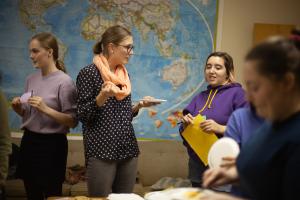 Last fall, the US Department of Education proposed new Title IX regulations that, if made into law, could require significant changes in how Marlboro addresses claims of sexual harassment, sexual assault, and similar rights violations. Despite these new recommendations, and the clamor of debate about their possible impacts, Marlboro has continued to provide a coherent and compassionate response system with many important improvements in recent years.
Last fall, the US Department of Education proposed new Title IX regulations that, if made into law, could require significant changes in how Marlboro addresses claims of sexual harassment, sexual assault, and similar rights violations. Despite these new recommendations, and the clamor of debate about their possible impacts, Marlboro has continued to provide a coherent and compassionate response system with many important improvements in recent years.
“Regardless of the shifting political landscape in Washington around Title IX, Marlboro is still operating under best practices and from a student-centered perspective,” says Patrick Connelly, dean of students. “I think that schools like us that have any kind of moral center are saying, ‘We know what is best practice even if Washington doesn’t fully agree with it.’ We’re going to stay the course as long as there is no legal requirement that we implement the recommendations.”
“Marlboro has worked hard over the years to ensure that we have dealt with Title IX cases fairly, thoroughly, and with respect to our shared community values of safety, learning, and inclusiveness,” said President Kevin in a December letter to the community responding to the new recommendations. “The community has done this work deliberately and carefully in consultation with our Title IX counsel, as well as with consultation with community members. We plan to continue this approach and to address the proposed regulations and implementation of them in this manner.”
As described two years ago in Potash Hill by Robyn Manning-Samuels ’14, then coordinator of sexual respect and wellness, the starting point for Title IX policy at Marlboro and other colleges and universities was the 2011 “Dear Colleague” letter issued by the Obama administration (“Positive Sexuality on Campus,” Fall 2017). Since then, Marlboro has made great strides in prevention and sexual wellness programs, as described by Robyn, but also in adjudicating sexual misconduct cases and providing support for all parties involved. Part of this comes with having a dedicated Title IX coordinator, Brattleboro attorney Jean Kiewel, rather than pinning the role on the dean of students.
“It’s unusual to have someone of Jean’s caliber and qualifications at a school this size,” says Patrick. “It’s a serious challenge to be the dean of students, to support and grow community, when you’re also the investigator and the adjudicator for Title IX cases. Being able to fully be the dean of students is a luxury that doesn’t exist on many small campuses. Meanwhile, I am able to support a Title IX team that meets regularly and is proactive, not just about investigations but about the educational aspects and constant, ongoing building of a safe and respectful community. That’s really unusual too.”
That team includes Megan Grove, coordinator for campus prevention, intervention, and advocacy, who ably filled Robyn’s boots as survivor advocate, but has also been expanded to include Dylan Muller, assistant director of residence life and community standards, who acts in the new role of respondent advisor. The team is completed by Jay Sparks, director of campus safety, who is a resource for students and coordinates reporting by contract security officers and on-call staff.
 “This expanded team is much more qualified to meet the needs of students and respond to concerns,” says Jean. “Not only are we totally on target for meeting the mandates for Title IX, we are doing some really great work that is over and above these mandates. These include offering informal resolution options to cases, and a recent memorandum of understanding with the Vermont State Police that can expedite investigations, if desired. Our Title IX panel has a diversity of conscientious faculty and staff who enthusiastically volunteer their time for the good of the community.”
“This expanded team is much more qualified to meet the needs of students and respond to concerns,” says Jean. “Not only are we totally on target for meeting the mandates for Title IX, we are doing some really great work that is over and above these mandates. These include offering informal resolution options to cases, and a recent memorandum of understanding with the Vermont State Police that can expedite investigations, if desired. Our Title IX panel has a diversity of conscientious faculty and staff who enthusiastically volunteer their time for the good of the community.”
“We are working toward our team and volunteers having trauma-informed training,” says Megan. “It’s important to know how people hold trauma in their bodies and understand that the way trauma manifests can vary widely. One of our main objections to the new Title IX recommendations is just how dangerous and irresponsible it is to put trauma survivors in face-to-face hearings with cross-examinations.” The Title IX team is not entirely ruling out all of the new recommendations, and have been able to distinguish those they feel are appropriate or potentially harmful. For instance, more accommodations are allowed for respondents if needed, such as academic or housing accommodations, and that is in keeping with Marlboro’s practice and approach.
But the team fears the overall effect of a number of the regulations, if enacted, could make the process more limited in scope, as well as more stressful and expensive. The team feels it could lead to less reporting of sexual harassment and sexual violence at Marlboro. They are waiting for more legal tests of the new recommendations, but in the meantime they are well-positioned and well-qualified to respond to cases on campus.
“I can confidently say that in the state of Vermont, for colleges that aren’t Middlebury or UVM, we’re doing it the best,” says Patrick. “It truly is amazing, given our resources and given the added complexity of community governance. We’re nailing it.”
Interns Bring New Energy to Farm and Forest
From May through August, two new interns contributed significantly to ongoing sustainability efforts in two key areas. Jacob Lepkoff and Taliesin Haugh brought a wealth of experience to their roles in the community farm and the forest reserve, respectively, and helped move the college toward goals in each case.
“These new community members help keep things moving over the summer, when there is most to be gained in managing both the farm and the forest reserve, but when our capacity is usually at its minimum,” says Todd Smith, chemistry professor. As the sustainability projects manager, Todd was instrumental in searching for and hiring these two very qualified interns. “This was a trial run for this summer, to be assessed for possible repetition in future years.”
“Working with any biological system, you interact with so many living pieces of that system,” said Jacob, who graduated from Sterling College with a bachelor’s in sustainable agriculture and has worked on a number of farms for 10 seasons. “It’s a joy to work in a living system because you are forced to observe and guess continuously. It is very engaging and rewarding. With every new experience I feel I’m offered a new opportunity to improve my guesses.”
Jacob worked closely over the summer with students Claire O’Pray ’20 and Emerson Gray Koetter ’22, who were able to pursue their own research interests as well as maintain the farm and produce some food. Taliesin, who recently completed his master’s in sustainable development at SIT Graduate Institute, worked more independently on the forest reserve, but was available as a resource for students conducting research there such as Hailey Mount ’20.
“This internship is an exciting opportunity to build the key systems knowledge, frameworks, and skills required to help facilitate a larger societal shift toward sustainable land management, as well as place-based community building,” said Taliesin. “Marlboro took on a huge commitment with this forest reserve, and it’s exciting but daunting to be here at the ground floor of decades of continuous work and research. I hope we set a good foundation for future students and faculty to build on for years to come.”
Three Longtime Faculty Find New Horizons
Marlboro takes pride in how students find their passions through exploring new ideas and perspectives, and how the college’s interdisciplinary approach uniquely prepares them for new horizons. That is no less true for our faculty, three of whom are retiring this year to focus on new projects or directions inspired by their many years spent with Marlboro students and colleagues. Meg Mott (politics), John Sheehy (literature and writing), and John Willis (photography) will all be missed, but the community looks forward to seeing where their next steps take them.
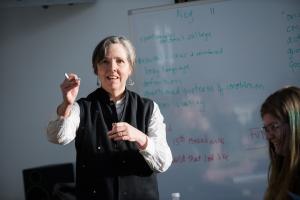 “My favorite part about teaching at Marlboro has been the luxury and solace of teaching old books to a rambunctious group of young thinkers,” says Meg, who has taught politics since 1999. After 20 years, she will be finishing up with her last Plan students this year. “I will miss sitting on the wall in front of the dining hall and watching new and returning students take charge of the campus in September and October.”
“My favorite part about teaching at Marlboro has been the luxury and solace of teaching old books to a rambunctious group of young thinkers,” says Meg, who has taught politics since 1999. After 20 years, she will be finishing up with her last Plan students this year. “I will miss sitting on the wall in front of the dining hall and watching new and returning students take charge of the campus in September and October.”
In popular classes like Debating the American Dream and American Political Thought, Meg boldly blended constitutional law with political theory, two subfields of political science that often don’t have much overlap. She also launched an ambitious semester intensive titled Speech Matters, in fall 2017 and spring 2017, which dove deeply into reframing the debate on addiction and life after incarceration, respectively.
“Thanks to the curricular freedom afforded at Marlboro, I’ve been able to make connections between Machiavelli and Antonin Scalia, Madison and Sandra Day O’Connor,” Meg says. Her political expertise also extended from the classroom to Marlboro’s shared governance model, Community Court, and Town Meeting, where she often served as “parliamentarian.” “Marlboro gave me many opportunities to think out loud in public. Controversial discussions in Town Meeting always sharpened my thought process, and I am so grateful for my worthy opponents.”
Meg’s next adventure involves political theory, the Bill of Rights, and—wait for it—choral music. In the summer of 2017, she created a series called Debating Our Rights, which has run at the Putney Public Library and the Brooks Memorial Library in Brattleboro. The Vermont Humanities Council recently signed her on as one of their speakers, ensuring that the series will be touring around the state. In February 2020, she’ll be presenting on the 19th Amendment at the Vermont State House. “We begin with a look at the political theory behind each of the amendments, the Supreme Court interpretations, and the popular debates those decisions have spawned,” says Meg. What’s more, starting this fall, she’ll be collaborating with composer Neely Bruce of Wesleyan University, who has set the Bill of Rights to music.
“Neely works with community singers, and I lead workshops on the theory and interpretations of select amendments. We conclude with a public performance and discussion on these precious liberties. We are beginning with a performance/workshop in Augusta, Maine, on the First Amendment, and intend to hit each of the 50 states by 2024.” By that time, Meg also hopes to have finished and published her book in progress, Good Clash: The Art of Productive Disagreement. See her recent BCTV presentation on the subject at bit.ly/33qM2xc.
“The political theorist is committed to thinking outside the box or, as Plato might say, ‘thinking outside the cave,’” wrote Meg in a Spring 2016 Potash Hill editorial. The community can rest assured that Meg will remain ever vigilant in this regard, guiding the masses from the mind-numbing shadows of the machine.
• • •
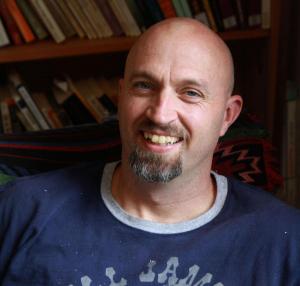 “I liked that Marlboro gave me the freedom to teach what I wanted, when I wanted, and how I wanted,” says John Sheehy, who retired this fall after teaching literature and writing at the college since 1998. “I also liked the way teaching at Marlboro stretched me as a teacher, making me learn new things, and new approaches to old things. But, really, the students—Marlboro students are a joy.”
“I liked that Marlboro gave me the freedom to teach what I wanted, when I wanted, and how I wanted,” says John Sheehy, who retired this fall after teaching literature and writing at the college since 1998. “I also liked the way teaching at Marlboro stretched me as a teacher, making me learn new things, and new approaches to old things. But, really, the students—Marlboro students are a joy.”
With titles like Apocalyptic Hope: The Literature of the American Renaissance and Tell about the South: The South in the American Literary Imagination, John’s literature seminars have covered everything from Faulkner to Emerson, Toni Morrison, Norman MacLean, and Cormac McCarthy. He loves books, and has an almost reverential regard for Moby Dick.
“When you teach a book, and this is true of many books that I love, there are many books that you can find the bottom of,” John said in a Fall 2014 Potash Hill interview. “You teach it once, you teach it twice, you teach it 10 times, and in the end of that you’ve found the edges of it, you know all of the things that are in it. And Moby Dick is not like that. I’ve been teaching it for 20 years and every time I teach it…there’s a bottom somewhere there but I haven’t found it. It’s a beautiful book.”
John explains that writing is an essential part of the learning process because it forces people to organize and present their thoughts with discipline, something people don’t always do when they are simply reading or talking about what they’ve read. For several years he led the Summer Writing Intensive, a weeklong workshop geared toward bringing together veterans as well as civilians through the art of writing, an experience he reflected on in a Chronicle of Higher Education editorial titled “Taking the Fight to the Page.”
It will come as no surprise to students in his Crime and Punishment class that John’s next move is going to law school, something he has contemplated since before his graduate work in literature. He’s not sure where it will lead, but has interests in public interest law, education law, or even going back to teaching.
“I’ve loved teaching legal writing, and would really love the opportunity to develop that as part of a pre-law curriculum somewhere,” says John. “We’ll see. For now, I’m kind of glad to be in the position of not knowing. It’s been a while since I didn’t know what tomorrow would look like.”
What John is certain of is that he will miss pretty much everything about Marlboro, especially teaching and the relationships he’s had with colleagues and, most of all, with students. “Marlboro has more or less made me who I am, so my time at Marlboro has helped inform this new adventure of mine in every conceivable way.”
• • •
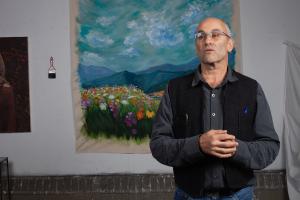 Photography professor John Willis is also retiring after being at Marlboro for 29 years, having started as a part-time adjunct faculty in 1990. He actually first taught a class at the college in 1980, when he had just graduated from Evergreen State College and had moved to the area. Someone invited him to the sauna at Marlboro, and there he learned from students that they were working on building a darkroom but didn’t have a photography teacher. He gladly taught an Intro to Photography class in exchange for taking an art history class with Willene Clark.
Photography professor John Willis is also retiring after being at Marlboro for 29 years, having started as a part-time adjunct faculty in 1990. He actually first taught a class at the college in 1980, when he had just graduated from Evergreen State College and had moved to the area. Someone invited him to the sauna at Marlboro, and there he learned from students that they were working on building a darkroom but didn’t have a photography teacher. He gladly taught an Intro to Photography class in exchange for taking an art history class with Willene Clark.
“The photography program was started by students, just like the film program,” says John, who will continue working with Plan students for this academic year. “I had six students who worked like crazy for no credits, and we set it up in the science building with a darkroom in a mop closet. When I left there was enough interest that they started having part-time adjunct faculty.”
John has enjoyed teaching students who find interesting ways to combine fine arts photography with their other academic work, and has sponsored Plans that spanned the curriculum, from foreign languages to physics. He has challenged students to take photographs that comment on the images they capture, and sees the classroom as a place for constructive criticism.
“I’ve learned so much from the students doing Plans,” says John. “I love the interdisciplinary nature of Marlboro. Teaching the same class over and over, including basic things like ‘this is how a camera works,’ could be boring. What makes it really amazing and interesting is how each student comes to it differently and does different work.”
John is also well known for co-founding In-Sight Photography Project, a Brattleboro-based youth arts program that uses photography as a medium to empower young people to find their own creative voices. Working with five Marlboro Plan students he also co-founded Exposures, In-Sight’s cross-cultural youth arts program that brings participants together from Vermont, Pine Ridge Reservation in South Dakota, and other communities to expand artistic and cultural horizons.
In the coming years John is planning on focusing more on his own work, collaborating with other artists, and probably traveling. He and his wife, Pauline, a nurse, have talked about spending part of the year abroad, applying for Fulbright fellowships, and perhaps even joining the Peace Corps. John credits Marlboro with opening his eyes to the value of travel, having participated in faculty-led trips to Cuba, China, Japan, Cambodia, Pine Ridge Reservation, and the Navajo Nation.
“One way Marlboro affected my life was waking me up to the realization of how amazing the world is, and seeing different cultures and traditions,” says John. “That whatever I grew up thinking was normal is really a construct of my circumstances, and that it’s really helpful to get to know people from different circumstances.”
Also of Note
In May, library staff held their Second Annual Rice-Aron Library Rice Cook-Off, pitting staff members against each other in a heated competition for the best rice dish, literary alluding rice dish, or Rice-Aron Library–alluding rice dish. Despite some stiff competition from the likes of homemade mochi, dragon rolls, and a Rice Krispy treat in the shape of a mouse and called Of Rice and Men, the first prize went to Kate Trzaskos (pictured right), assistant dean of career education, for her cauliflower-rice A Tale of Two Rices. Kate will proudly display the coveted, rice-encrusted, gold-painted trophy until next year.
“I wanted to explain how I see in Spinoza’s philosophical system a way for white Americans to engage in antiracism work as a project of self-love and self-liberation,” says Anna Morrissey ’20, who presented their thoughts at a special summer Collegium Spinozanum at University of Groningen, Netherlands, in July. Anna went there with politics professor Meg Mott, who presented a paper on Spinoza and sexual violence at the same symposium. “Spinoza reveals that to ascribe to racist ideology, consciously or not, is to deny oneself a clear understanding of one’s reality, one’s power, and oneself,” says Anna, who was lauded by other participants for combining Spinoza and critical pedagogy.
In March, The Chronicle of Higher Education ranked Marlboro near the top of the heap in a list awkwardly titled “Where are students most and least likely to be taught by tenured and tenure-track professors?” Marlboro was ranked #2 among four-year private nonprofit institutions, bested only by—some of you may have heard of it—Yale University. Despite its diminutive size, Marlboro rose to the top of the list thanks to a high percentage of tenured or tenure-track faculty (87.5 percent) and the low ratio of students per tenured or tenure-track faculty (7:2). Read more.
After a long wait and and much deliberation, in May the Campus Store announced the talented winner of the “New Fighting Dead Tree Design Contest.” Cedar Van Tassel ’21 topped the competition with an expertly rendered line drawing of a beady-eyed tree that looks pugnacious but not angry, rugged but not mean, dead, perhaps, but still full of that Marlboro fighting spirit (pictured right). “It was a close vote, but we hope everyone will join us in congratulating Cedar and celebrating our new Fighting Dead Tree,” says Sophie Gorjance ’16, campus store manager. “We will work to produce new swag for next year.”
In April, students in SIT professor John Ungerleider’s Conflict and Identity class helped lead a dialogue workshop for the Pan-African Youth Leadership Program at the Vermont Statehouse in Montpelier. The program brings together high school students from across Africa with adult mentors for a three-week US-based training and cultural exchange, including learning about civic rights and responsibilities, respect for diversity, and the importance of community engagement. The Marlboro students were there to help John work with students and teachers from Uganda, Tanzania, Liberia, and Namibia about communication skills and the potential for civil dialogue in their communities and schools
In April, Lydia Nuhfer ’20 and Claire O’Pray ’20 presented a talk, “Digital Analyses of Royal Itineraries from the Crown of Aragon,” at the 40th Annual Medieval and Renaissance Forum at Keene State College. “We looked at digitized itineraries of the Crown of Aragon, using the travel patterns discovered in them to gain a better understanding of medieval travel and how a king’s travel patterns might have affected his reign or geopolitics,” says Claire. Using royal itineraries from between 1291 and 1410, they produced maps and other visualizations to examine differences in travel habits among rulers, in varying political climates, and within individual reigns.
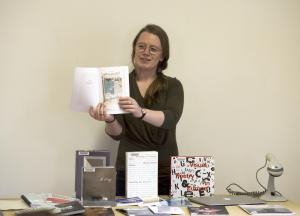 In May, Sophie Gorjance ’16 (pictured right) offered a public presentation in Apple Tree titled “Sensations of Understanding,” the culmination of her year as a postgraduate library fellow. Her fellowship project focused on the many ways the form of a book can convey information and meaning, and can shape one’s experience of “reading.” Specifically, she explored examples of wordless books, concrete poetry books, and books for sensory-impaired individuals, all of which she gathered for the library’s collection. She also discussed how this project grew out of her Plan work in creative writing, and how it fit into the fellowship as a whole.
In May, Sophie Gorjance ’16 (pictured right) offered a public presentation in Apple Tree titled “Sensations of Understanding,” the culmination of her year as a postgraduate library fellow. Her fellowship project focused on the many ways the form of a book can convey information and meaning, and can shape one’s experience of “reading.” Specifically, she explored examples of wordless books, concrete poetry books, and books for sensory-impaired individuals, all of which she gathered for the library’s collection. She also discussed how this project grew out of her Plan work in creative writing, and how it fit into the fellowship as a whole.
In June, Patrick Connelly (dean of students), Catherine O’Callaghan (assistant dean of academic advising), and Kate Trzaskos (assistant dean of career education) joined other college teams attending a Life Design Studio, a four-day immersive training in “life design,” at Stanford University. “Life design comes to Marlboro!” says Kate. “We’re bringing back ideas and curriculum to use with Marlboro students, starting with our first years in all First Year Seminars.” Founded by Bill Burnett and Dave Evans, authors of Designing Your Life, the Life Design Lab applies the principles of design thinking to approaches to college, career, and other life choices.
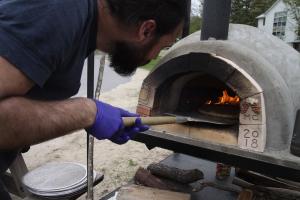 Michael Riley ’09, IT director, has been seen making one or two pizzas in the new portable pizza oven, crafted by students working with ceramics fellow David Eichelberger.
Michael Riley ’09, IT director, has been seen making one or two pizzas in the new portable pizza oven, crafted by students working with ceramics fellow David Eichelberger.
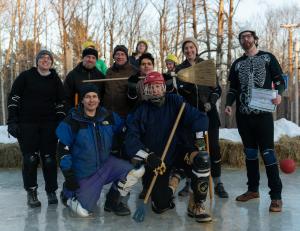 The staff-faculty team, Grim Sweepers, won the annual broomball competition in February, showing students that there is more to life than being young and flexible. Photo by David Teter ‘20
The staff-faculty team, Grim Sweepers, won the annual broomball competition in February, showing students that there is more to life than being young and flexible. Photo by David Teter ‘20
In July, excavation started for the new dormitory building to replace Howland, known by students as “New Howland.” No sign of Emily Mather’s grave yet (see "Hauntings on the Hill").
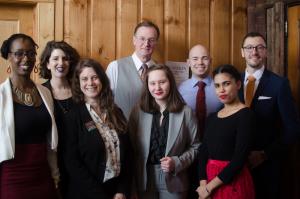 Who are these people? In February, familiar staff members and students took on unfamiliar personas for the annual “Dress for Success” event, part of Career Week. Photo by Clayton Clemetson ‘19
Who are these people? In February, familiar staff members and students took on unfamiliar personas for the annual “Dress for Success” event, part of Career Week. Photo by Clayton Clemetson ‘19
Events
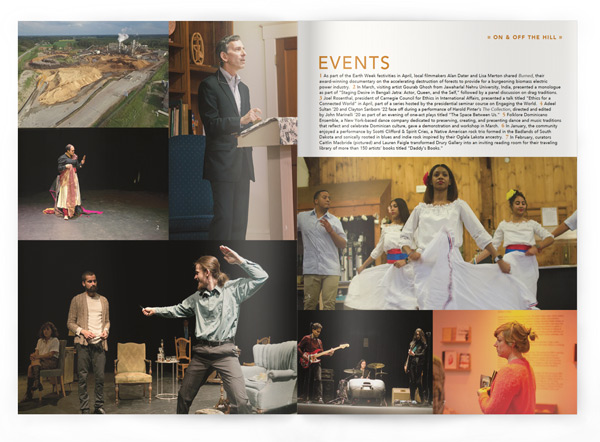
1 As part of the Earth Week festivities in April, local filmmakers Alan Dater and Lisa Merton shared Burned, their award-winning documentary on the accelerating destruction of forests to provide for a burgeoning biomass electric power industry. 2 In March, visiting artist Gourab Ghosh from Jawaharlal Nehru University, India, presented a monologue as part of “Staging Desire in Bengali Jatra: Actor, Queen, and the Self,” followed by a panel discussion on drag traditions. 3 Joel Rosenthal, president of Carnegie Council for Ethics in International Affairs, presented a talk titled “Ethics for a Connected World” in April, part of a series hosted by the presidential seminar course on Engaging the World. 4 Adeel Sultan ’20 and Clayton Sanborn ’22 face off during a performance of Harold Pinter’s The Collection, directed and edited by John Marinelli ’20 as part of an evening of one-act plays titled “The Space Between Us.” 5 Folklore Dominicano Ensemble, a New York-based dance company dedicated to preserving, creating, and presenting dance and music traditions that reflect and celebrate Dominican culture, gave a demonstration and workshop in March. 6 In January, the community enjoyed a performance by Scotti Clifford & Spirit Cries, a Native American rock trio formed in the Badlands of South Dakota and sonically rooted in blues and indie rock inspired by their Oglala Lakota ancestry. 7 In February, curators Caitlin Macbride (pictured) and Lauren Faigle transformed Drury Gallery into an inviting reading room for their traveling library of more than 150 artists’ books titled “Daddy’s Books.”
Focus on Faculty
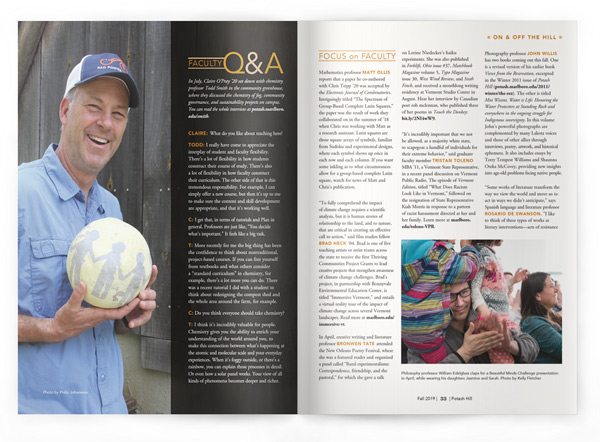
Faculty Q&A
In July, Claire O’Pray ’20 sat down with chemistry professor Todd Smith in the community greenhouse, where they discussed the chemistry of fog, community governance, and sustainability projects on campus. You can read the whole interview.
Claire: What do you like about teaching here?
Todd: I really have come to appreciate the interplay of student and faculty flexibility. There’s a lot of flexibility in how students construct their course of study. There’s also a lot of flexibility in how faculty construct their curriculum. The other side of that is this tremendous responsibility. For example, I can simply offer a new course, but then it’s up to me to make sure the content and skill development are appropriate, and that it’s working well.
C: I get that, in terms of tutorials and Plan in general. Professors are just like, “You decide what’s important.” It feels like a big task.
T: More recently for me the big thing has been the confidence to think about nontraditional, project-based courses. If you can free yourself from textbooks and what others consider a “standard curriculum” in chemistry, for example, there’s a lot more you can do. There was a recent tutorial I did with a student to think about redesigning the compost shed and the whole area around the farm, for example.
C: Do you think everyone should take chemistry?
T: I think it’s incredibly valuable for people. Chemistry gives you the ability to enrich your understanding of the world around you, to make this connection between what’s happening at the atomic and molecular scale and your everyday experiences. When it’s foggy outside, or there’s a rainbow, you can explain those processes in detail. Or even how a solar panel works. Your view of all kinds of phenomena becomes deeper and richer.
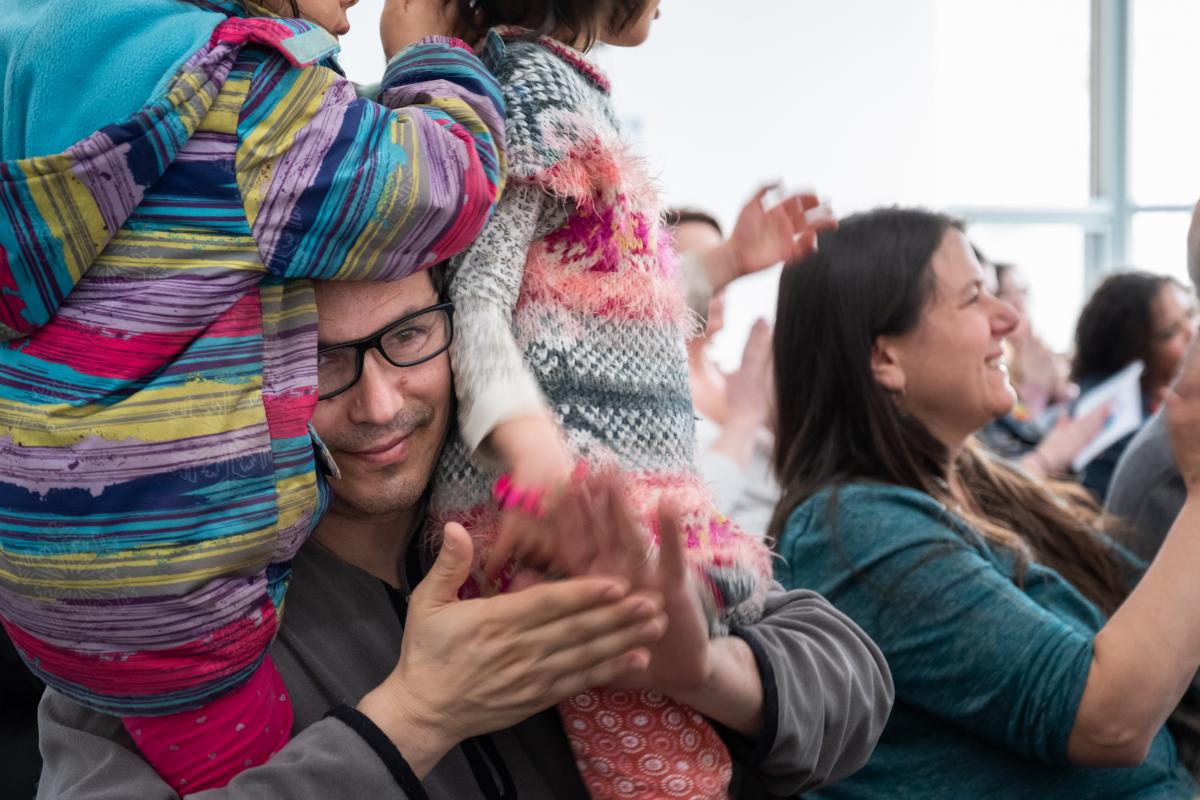 Mathematics professor Matt Ollis reports that a paper he co-authored with Chris Tripp ’20 was accepted by the Electronic Journal of Combinatorics. Intriguingly titled “The Spectrum of Group-Based Complete Latin Squares,” the paper was the result of work they collaborated on in the summer of ’18 when Chris was working with Matt as a research assistant. Latin squares are those square arrays of symbols, familiar from Sudoku and experimental designs, where each symbol shows up once in each row and each column. If you want some inkling as to what circumstances allow for a group-based complete Latin square, watch for news of Matt and Chris’s publication.
Mathematics professor Matt Ollis reports that a paper he co-authored with Chris Tripp ’20 was accepted by the Electronic Journal of Combinatorics. Intriguingly titled “The Spectrum of Group-Based Complete Latin Squares,” the paper was the result of work they collaborated on in the summer of ’18 when Chris was working with Matt as a research assistant. Latin squares are those square arrays of symbols, familiar from Sudoku and experimental designs, where each symbol shows up once in each row and each column. If you want some inkling as to what circumstances allow for a group-based complete Latin square, watch for news of Matt and Chris’s publication.
“To fully comprehend the impact of climate change requires a scientific analysis, but it is human stories of relationship to the land, and to nature, that are critical in creating an effective call to action,” said film studies fellow Brad Heck '04. Brad is one of five teaching artists or artist teams across the state to receive the first Thriving Communities Project Grants to lead creative projects that strengthen awareness of climate change challenges. Brad’s project, in partnership with Bonnyvale Environmental Education Center, is titled “Immersive Vermont,” and entails a virtual reality tour of the impact of climate change across several Vermont landscapes. Read more.
In April, creative writing and literature professor Bronwen Tate attended the New Orleans Poetry Festival, where she was a featured reader and organized a panel called “Rural experimentalisms: Correspondence, friendship, and the pastoral,” for which she gave a talk on Lorine Niedecker’s haiku experiments. She was also published in Forklift, Ohio issue #37, Matchbook Magazine volume 5, Typo Magazine issue 30, West Wind Review, and Sixth Finch, and received a monthlong writing residency at Vermont Studio Center in August. Hear her interview by Canadian poet rob mclennan, who published three of her poems in Touch the Donkey.
“It’s incredibly important that we not be allowed, as a majority white state, to scapegoat a handful of individuals for their extreme behavior,” said graduate faculty member Tristan Toleno MBA ’11, a Vermont State Representative, in a recent panel discussion on Vermont Public Radio. The episode of Vermont Edition, titled “What Does Racism Look Like in Vermont,” followed on the resignation of State Representative Kiah Morris in response to a pattern of racist harassment directed at her and her family. Learn more.
Photography professor John Willis has two books coming out this fall. One is a revised version of his earlier book Views from the Reservation, excerpted in the Winter 2011 issue of Potash Hill. The other is titled Mni Wiconi, Water is Life: Honoring the Water Protectors at Standing Rock and everywhere in the ongoing struggle for Indigenous sovereignty. In this volume John’s powerful photographs are complemented by many Lakota voices and those of other allies through interviews, poetry, artwork, and historical ephemera. It also includes essays by Terry Tempest Williams and Shaunna Oteka McCovey, providing new insights into age-old problems facing native people.
“Some works of literature transform the way we view the world and move us to act in ways we didn’t anticipate,” says Spanish language and literature professor Rosario de Swanson. “I like to think of these types of works as literary interventions—acts of resistance by means of representation—that can produce change.” Rosario wrote three blog posts on “Literature as Resistance” for Massachusetts Humanities, focusing on Mexican feminist Rosario Castellanos, Guinean writer María Nsué, and Afro-Peruvian writer Nicomedes Santa Cruz. Learn more. In July, Rosario led a discussion and presented a paper in a panel devoted to postcolonial research at the American Association of Teachers of Spanish and Portuguese conference in San Diego, California.
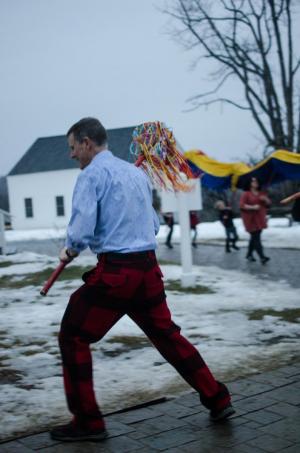 Anthropology professor Nelli Sargsyan co-edited a special issue of History and Anthropology (volume 30, issue 1), with her colleague Larisa Kurtović of University of Ottawa, titled “After Utopia: Leftist imaginaries and activist politics in the postsocialist world.” They also co-authored the introduction to the same issue, and Nelli published an individual article titled “Experience-sharing as feminist praxis: Imagining a future of collective care.” She will be making two presentations at the National Women’s Studies Association Annual Conference, taking place in San Francisco in November, on the theme “Protest, Justice, and Transnational Organizing.”
Anthropology professor Nelli Sargsyan co-edited a special issue of History and Anthropology (volume 30, issue 1), with her colleague Larisa Kurtović of University of Ottawa, titled “After Utopia: Leftist imaginaries and activist politics in the postsocialist world.” They also co-authored the introduction to the same issue, and Nelli published an individual article titled “Experience-sharing as feminist praxis: Imagining a future of collective care.” She will be making two presentations at the National Women’s Studies Association Annual Conference, taking place in San Francisco in November, on the theme “Protest, Justice, and Transnational Organizing.”
Philosophy and environmental studies professor William Edelglass published “‘That is why the Buddha laughs’: Apophasis, Buddhist practice, and the paradox of language” in Journal of Dharma Studies. This summer William gave a series of lectures to Chinese philosophers on environmental philosophy at East China Normal University, in Shanghai, as part of a joint program of the Royal Institute of Philosophy (UK) and the Chinese Academy of Social Sciences. He has been appointed the new director of studies at the Barre Center for Buddhist Studies, located in Barre, Massachusetts, where he has been teaching since 2015. See a recent commentary by William in Lion’s Roar on “How Buddhists can benefit from Western philosophy.”
In April, sculpture professor William Ransom presented an exhibit titled “Hold Everything” in both the Drury Gallery and the lobby of the Snyder Center for the Visual Arts. In all of his work, which spans sculpture, installation, video, and drawing, William creates sculptural situations where viewers can “grasp the tenuousness of time held in the static grip of an object, action, or image.” This exhibition, and an associated artist’s talk and reception, highlighted recent sculptural work in wood and everyday materials, arranged in ways that propose new spatial experiences in familiar spaces.
Theater professor Brenda Foley was a contributing playwright to the Boston production of The Audacity: Women Speak, a multivocal theater project produced in April by Sleeping Weazel at the Boston Center for the Arts. The production was awarded the 2019 Elliot Norton Award for outstanding production by a small theater, presented annually by the Boston Theater Critics Association. Brenda was also an invited speaker for a two-day Wheaton College symposium on Narrative Medicine and the Healing Arts, in collaboration with Charlotte Meehan, Strong Oak Lefebvre, Stephanie Burlington Daniels, Sarah Gambito, Maya Breuer, and Robbie McCauley.
 “The First Amendment is the Queen of Rights,” says politics professor Meg Mott. “Without freedom of speech and freedom of assembly, we don’t have a liberal democracy. But none of the freedoms in the Bill of Rights are absolute. Even speech needs to be regulated in order to protect the public peace. The question is, where do we draw the line?” Meg opened up the First Amendment for debate in June at Brattleboro’s Brooks Memorial Library, part of her ongoing Debating Our Rights series. She followed with a discussion of the Second and Third Amendments in July. Learn more.
“The First Amendment is the Queen of Rights,” says politics professor Meg Mott. “Without freedom of speech and freedom of assembly, we don’t have a liberal democracy. But none of the freedoms in the Bill of Rights are absolute. Even speech needs to be regulated in order to protect the public peace. The question is, where do we draw the line?” Meg opened up the First Amendment for debate in June at Brattleboro’s Brooks Memorial Library, part of her ongoing Debating Our Rights series. She followed with a discussion of the Second and Third Amendments in July. Learn more.
In April, music professor Matan Rubinstein presented the inaugural event for Marlboro’s new “ensemble in residence,” called Marlboro Slipstream Group. Also known as MSG, the ensemble is composed of Matan (piano, electronics), Jake Charkey (cello), Andrew Greenwald (drums, percussion), and Ned Rothenberg (alto saxophone, clarinet, bass clarinet, and shakuhachi). “MSG was conceived as a musical meeting of four performers/composers/ improvisers of wildly different musical backgrounds, to make music that is betwixt and between,” says Matan. The program included the world premiere of Terraplane, a multimovement composition inspired by Jack Womack’s dystopian parallel-universe science fiction novel by the same title.
Commencement 2019
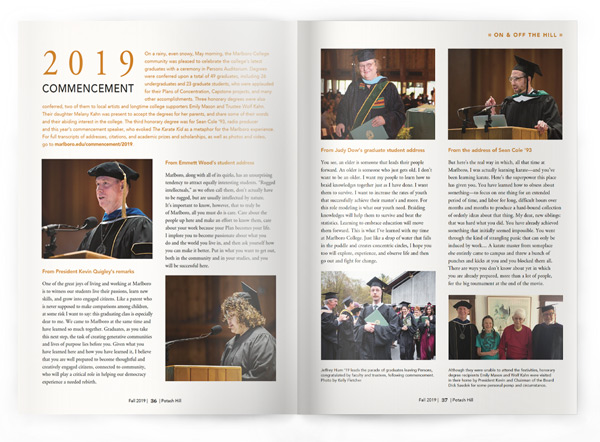
On a rainy, even snowy, May morning, the Marlboro College community was pleased to celebrate the college’s latest graduates with a ceremony in Persons Auditorium. Degrees were conferred upon a total of 49 graduates, including 26 undergraduates and 23 graduate students, who were applauded for their Plans of Concentration, Capstone projects, and many other accomplishments. Three honorary degrees were also conferred, two of them to local artists and longtime college supporters Emily Mason and Trustee Wolf Kahn. Their daughter Melany Kahn was present to accept the degrees for her parents, and share some of their words and their abiding interest in the college. The third honorary degree was for Sean Cole ‘93, radio producer and this year’s commencement speaker, who evoked The Karate Kid as a metaphor for the Marlboro experience. For full transcripts of addresses, citations, and academic prizes and scholarships, as well as photos and video, go to marlboro.edu/commencement/2019.
From President Kevin Quigley’s remarks One of the great joys of living and working at Marlboro is to witness our students live their passions, learn new skills, and grow into engaged citizens. Like a parent who is never supposed to make comparisons among children, at some risk I want to say: this graduating class is especially dear to me. We came to Marlboro at the same time and have learned so much together. Graduates, as you take this next step, the task of creating generative communities and lives of purpose lies before you. Given what you have learned here and how you have learned it, I believe that you are well prepared to become thoughtful and creatively engaged citizens, connected to community, who will play a critical role in helping our democracy experience a needed rebirth.
From Emmett Wood’s student address
Marlboro, along with all of its quirks, has an unsurprising tendency to attract equally interesting students. “Rugged intellectuals,” as we often call them, don’t actually have to be rugged, but are usually intellectual by nature. It’s important to know, however, that to truly be of Marlboro, all you must do is care. Care about the people up here and make an effort to know them, care about your work because your Plan becomes your life. I implore you to become passionate about what you do and the world you live in, and then ask yourself how you can make it better. Put in what you want to get out, both in the community and in your studies, and you will be successful here.
From Judy Dow’s graduate student address You see, an elder is someone that leads their people forward. An older is someone who just gets old. I don’t want to be an older. I want my people to learn how to braid knowledges together just as I have done. I want them to survive. I want to increase the rates of youth that successfully achieve their master’s and more. For this role modeling is what our youth need. Braiding knowledges will help them to survive and beat the statistics. Learning to embrace education will move them forward. This is what I’ve learned with my time at Marlboro College. Just like a drop of water that falls in the puddle and creates concentric circles, I hope you too will explore, experience, and observe life and then go out and fight for change.
From the address of Sean Cole ’93
But here’s the real way in which, all that time at Marlboro, I was actually learning karate—and you’ve been learning karate. Here’s the superpower this place has given you. You have learned how to obsess about something—to focus on one thing for an extended period of time, and labor for long, difficult hours over months and months to produce a hard-bound collection of orderly ideas about that thing. My dear, new siblings: that was hard what you did. You have already achieved something that initially seemed impossible. You went through the kind of strangling panic that can only be induced by work.... A karate master from someplace else entirely came to campus and threw a bunch of punches and kicks at you and you blocked them all. There are ways you don’t know about yet in which you are already prepared, more than a lot of people, for the big tournament at the end of the movie.